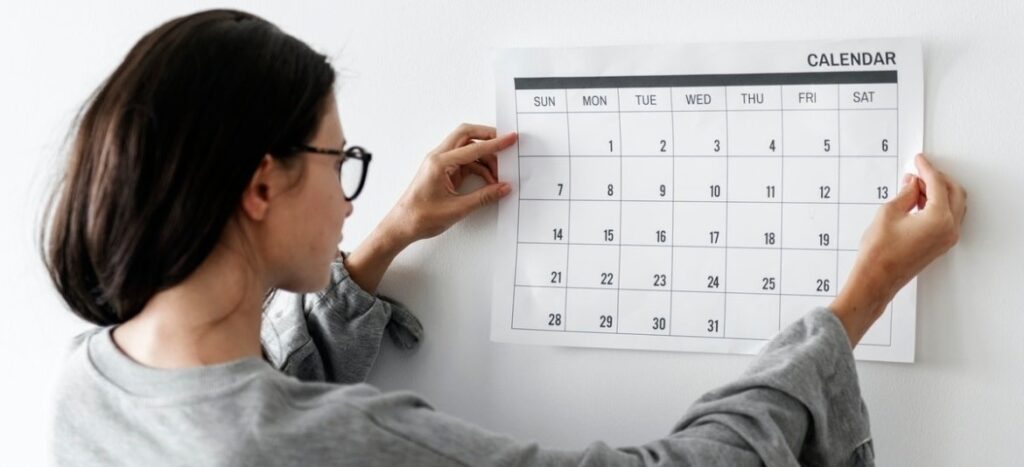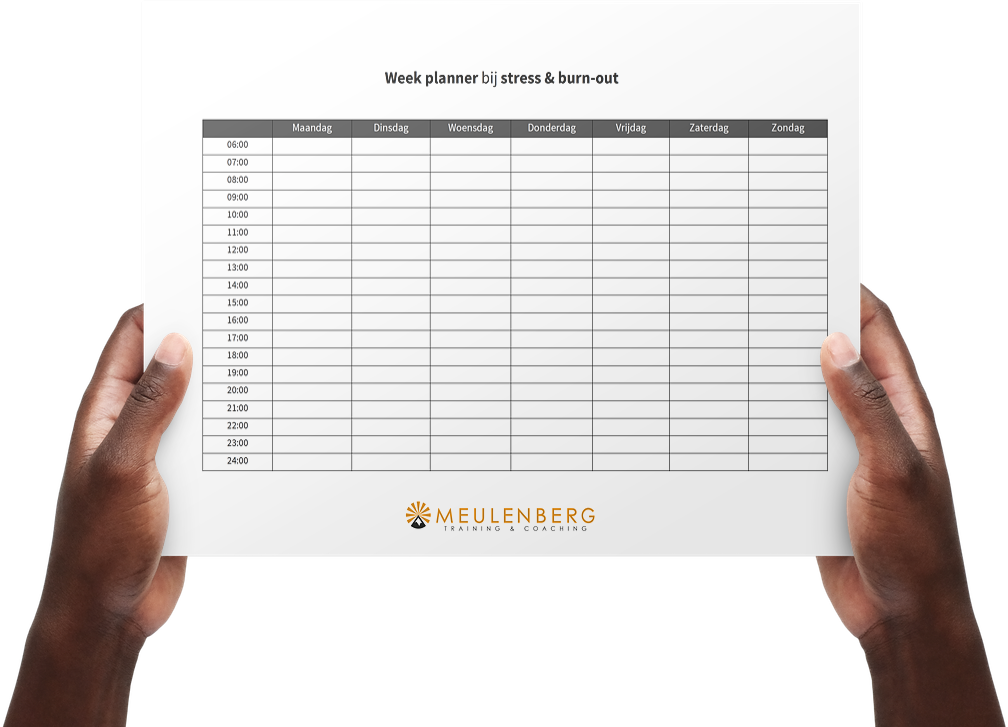A weekly plan or a daily schedule can help you make your week more manageable and thus create more peace and structure in your life. With stress and burnout it is important to have something to hold on to in your week. A plan helps you to become more balanced and prevents you from overstepping your boundaries.
Do you need more insight into your weekly schedule and are you completely done with that constant feeling of stress? Or do you suffer from burnout and would you like to plan your time and energy step by step? Then read on and get to work with your personal weekly planner.
A weekly schedule provides structure.
Structure is very important if you are under a lot of stress or suffer from burnout, because it allows you to create the peace needed for recovery. A schedule gives you an overview of what you need to give your energy to and at what moments you need more rest.
Peace of mind!
Do you ever feel stressed because of all the things you are thinking about? Thoughts about everything you have to do or should not forget, cause restlessness. The structure of a weekly schedule will be a relief to you. You won’t have to think and fret about what to do all the time and once you have planned what needs to be done, you will not have to remember it all. When you are able to follow your planning for a period of time, your head and body will relax more.
Fixed sleep rhythm
A fixed sleep rhythm means that you go to bed at a fixed time and get up at a fixed time. It is a good idea to include your fixed bedtimes in your planning. This way, your brain will recognise when it is time to go to sleep and this will help you fall asleep more easily. Your body will know when to rest and when to be active.
An evening bedtime routine will help you to relax and get to sleep quicker. Do not look at a screen one hour before you go to bed. No more television, computer or laptop before bedtime and, if possible, turn off your phone too. Choose for example a cup of tea with a magazine, a warm shower or a relaxation exercise.
Fixed meal times
It is also good to plan meals and snacks at regular times. By eating at regular times, you avoid peaks and troughs in your blood sugar levels, therefore avoiding a drop in your energy levels. Moreover, such a routine gives you more peace of mind and something to hold on to.

Insight into your energy expenditure
Another great advantage of a weekly schedule is that it gives you more insight into how you use your energy. You discover why you feel burnt out at certain moments and why you are better on other days. If, for example, you notice that you are very tired especially in the afternoons, it is better to plan a rest or relaxation moment at that time in your schedule.
A weekly plan or a daily schedule
Is it best to plan by day, by week or by month? Chances are that you immediately want to plan a lot. You are diligent and do not want to be seen as lazy. Being diligent is a nice quality, but if you want to do too much in too short a time, you will be stressed.
Especially if you are currently suffering from burnout, the trick is not to plan too far ahead and not to want too much right away. To start with, it can be good to plan per day. Make a daily schedule and at the end of the day see where you need to make adjustments. Once you have more insight into your energy level, you can make a weekly plan. By not planning too far ahead you can adjust your schedule whenever necessary and avoid disappointment or the feeling of failure.
How do you make a balanced weekly schedule?
It can be quite a challenge to create a balanced schedule. You want to get as much done as possible in one day and so you run the risk of overdoing it and not relaxing enough. How do you avoid making a schedule that is too full?
Download Schedule

To help you, we have two fillable planners ready for you.
Click on the links below to download.
Plan fixed moments of rest
You can avoid over-scheduling by first planning fixed moments of relaxation and rest. Small breaks, such as sitting on the sofa at 4 p.m. having a cup of tea, can make all the difference. These are your regular moments in the day to relax and they are essential for your recovery.
Determine your priorities
Next, plan what is most important to you or things that really needs to be done. In the beginning of your burnout, this might mean that you only plan to shower and prepare a healthy meal. If that is your main task for the day and you achieve your goal, you can be genuinely proud of that.
As you recover, you can add more and more into your weekly planning. But always plan what has the highest priority first and then the less important things. This way you will experience more peace and less frustration.

Reflect and adjust
At the end of the day or week, reflect back. How did you feel today? What went well and what went less well? What things didn’t work out and why? By reflecting in this way and adjusting your planning, you get more insight into what causes stress and how you can become more balanced.
Can we help you?
Leave us your information and one of our coaches will contact you in 24H

Less stress with a weekly schedule
Providing structure helps enormously in recovering from burnout and reducing stress. Therefore, make your week more manageable and create the rest you so badly need. A weekly schedule will help you find the balance between effort and relaxation and will give you something to hold on to in your recovery.
What do you struggle with when making a weekly schedule or a daily plan? Do you succeed in making a balanced schedule? Leave a comment below and maybe we can help you further.
Stress & burnout coaching; for 100% recovery!
Reducing stress and recovering from burnout is simply incredibly difficult. The coaches at Meulenberg Training & Coaching understand exactly what you are going through and know how tough it can be. They have often experienced it themselves! With their years of experience and expertise, they are ready to help you step by step toward a full recovery. The results of our one-on-one coaching and absenteeism training will benefit you for a lifetime!






